海牙国际私法会议
海牙《选择法院协议公约》评介
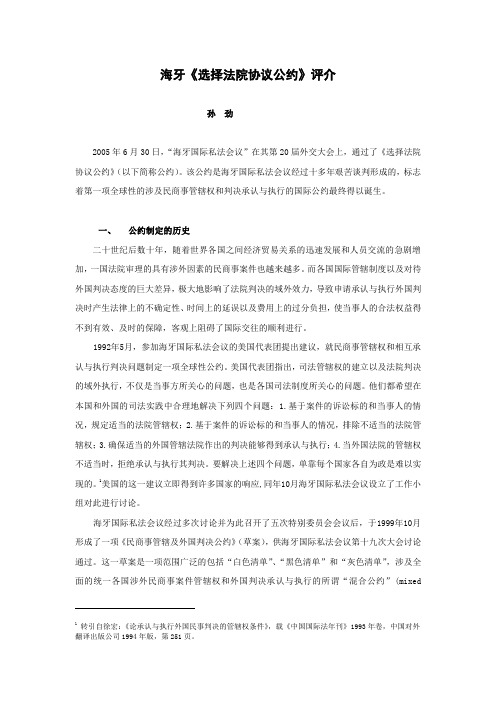
海牙《选择法院协议公约》评介孙劲2005年6月30日,“海牙国际私法会议”在其第20届外交大会上,通过了《选择法院协议公约》(以下简称公约)。
该公约是海牙国际私法会议经过十多年艰苦谈判形成的,标志着第一项全球性的涉及民商事管辖权和判决承认与执行的国际公约最终得以诞生。
一、公约制定的历史二十世纪后数十年,随着世界各国之间经济贸易关系的迅速发展和人员交流的急剧增加,一国法院审理的具有涉外因素的民商事案件也越来越多。
而各国国际管辖制度以及对待外国判决态度的巨大差异,极大地影响了法院判决的域外效力,导致申请承认与执行外国判决时产生法律上的不确定性、时间上的延误以及费用上的过分负担,使当事人的合法权益得不到有效、及时的保障,客观上阻碍了国际交往的顺利进行。
1992年5月,参加海牙国际私法会议的美国代表团提出建议,就民商事管辖权和相互承认与执行判决问题制定一项全球性公约。
美国代表团指出,司法管辖权的建立以及法院判决的域外执行,不仅是当事方所关心的问题,也是各国司法制度所关心的问题。
他们都希望在本国和外国的司法实践中合理地解决下列四个问题:1.基于案件的诉讼标的和当事人的情况,规定适当的法院管辖权;2.基于案件的诉讼标的和当事人的情况,排除不适当的法院管辖权;3.确保适当的外国管辖法院作出的判决能够得到承认与执行;4.当外国法院的管辖权不适当时,拒绝承认与执行其判决。
要解决上述四个问题,单靠每个国家各自为政是难以实现的。
1美国的这一建议立即得到许多国家的响应,同年10月海牙国际私法会议设立了工作小组对此进行讨论。
海牙国际私法会议经过多次讨论并为此召开了五次特别委员会会议后,于1999年10月形成了一项《民商事管辖及外国判决公约》(草案),供海牙国际私法会议第十九次大会讨论通过。
这一草案是一项范围广泛的包括“白色清单”、“黑色清单”和“灰色清单”,涉及全面的统一各国涉外民商事案件管辖权和外国判决承认与执行的所谓“混合公约”(mixed1转引自徐宏:《论承认与执行外国民事判决的管辖权条件》,载《中国国际法年刊》1993年卷,中国对外翻译出版公司1994年版,第251页。
试述 1989 年海牙《死者遗产继承法律适用公约》的主要内容
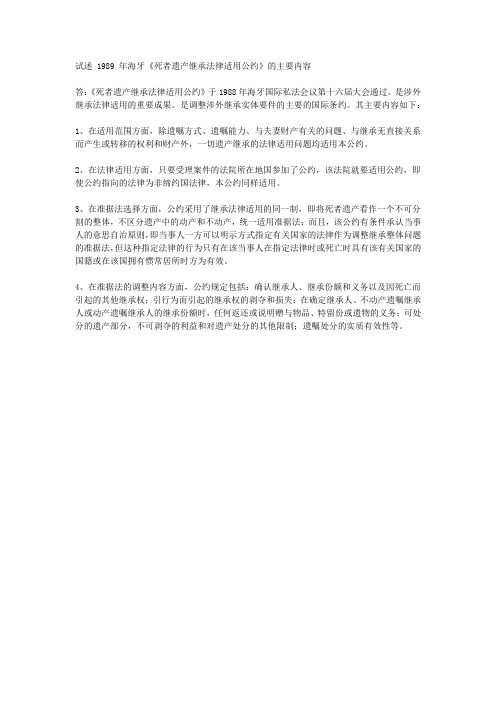
试述 1989 年海牙《死者遗产继承法律适用公约》的主要内容
答:《死者遗产继承法律适用公约》于1988年海牙国际私法会议第十六届大会通过。
是涉外继承法律适用的重要成果。
是调整涉外继承实体要件的主要的国际条约。
其主要内容如下:
1、在适用范围方面,除遗嘱方式、遗嘱能力、与夫妻财产有关的问题、与继承无直接关系而产生或转移的权利和财产外,一切遗产继承的法律适用问题均适用本公约。
2、在法律适用方面,只要受理案件的法院所在地国参加了公约,该法院就要适用公约,即使公约指向的法律为非缔约国法律,本公约同样适用。
3、在准据法选择方面,公约采用了继承法律适用的同一制,即将死者遗产看作一个不可分割的整体,不区分遗产中的动产和不动产,统一适用准据法;而且,该公约有条件承认当事人的意思自治原则,即当事人一方可以明示方式指定有关国家的法律作为调整继承整体问题的准据法,但这种指定法律的行为只有在该当事人在指定法律时或死亡时具有该有关国家的国籍或在该国拥有惯常居所时方为有效。
4、在准据法的调整内容方面,公约规定包括:确认继承人、继承份额和义务以及因死亡而引起的其他继承权;引行为而引起的继承权的剥夺和损失;在确定继承人、不动产遗嘱继承人或动产遗嘱继承人的继承份额时,任何返还或说明赠与物品、特留份或遗物的义务;可处分的遗产部分,不可剥夺的利益和对遗产处分的其他限制;遗嘱处分的实质有效性等。
海牙国际私法会议

海牙国际私法会议海牙国际私法会议是一个国际组织,也是国际私法领域的重要组织。
本文将介绍海牙国际私法会议的背景、目标和重要成果。
海牙国际私法会议成立于1893年,总部设在荷兰海牙。
它的目标是通过国际协商和立法,推动国家之间私法关系的协调和统一。
该组织通过编制和推动制定国际公约,来解决跨国民事和商事纠纷。
会议的成员包括各国政府代表和专家学者。
海牙国际私法会议的工作领域涵盖了婚姻、离婚、破产、承认和执行判决等多个领域。
其中最著名的成果之一是《国际婚姻法公约》,该公约于1978年通过,在全球范围内推动了婚姻法的协调和统一。
根据该公约,各国应当自动承认其他国家的婚姻和离婚判决,从而避免了婚姻跨国纠纷的发生和繁琐的司法程序。
另一个重要成果是《国际承认和执行判决公约》。
该公约于1954年通过,目的是促进国际判决的承认和执行。
根据该公约,任何国家的判决在其他缔约国都应该得到承认和执行。
这个公约增强了国际判决的效力,创造了更加有利于国际贸易和投资的法律环境。
此外,海牙国际私法会议还制定了一系列关于国际继承、国际民事责任、国际商法等方面的公约和指南。
这些公约和指南为各国提供了行动准则和法律依据,加强了国际私法的统一和协调。
海牙国际私法会议每隔四年举办一次大会,在大会上会员国讨论和审议国际私法领域的重大问题,并制定工作计划和草案。
此外,海牙国际私法会议定期举办专题研讨会和培训班,促进成员国在私法领域的交流与合作。
总之,海牙国际私法会议作为一个国际组织,致力于国际私法领域的协调和统一。
通过制定国际公约和法律指南,海牙国际私法会议为各国提供了法律依据和行动准则,推动了国际私法的发展和进步。
它的成果对于促进跨国纠纷解决、国际贸易和投资的推动以及保护个人权益都起到了重要作用。
海牙国际私法会议在国际私法领域的工作涉及众多领域,如国际商法、国际家庭法、国际民事责任等。
其中,国际商法是该组织的一个重点领域。
海牙国际私法会议通过制定公约和指南,为国际商事交易提供了一系列规范和法律指引,进一步促进了国际贸易和投资的发展。
国际海牙规则内容
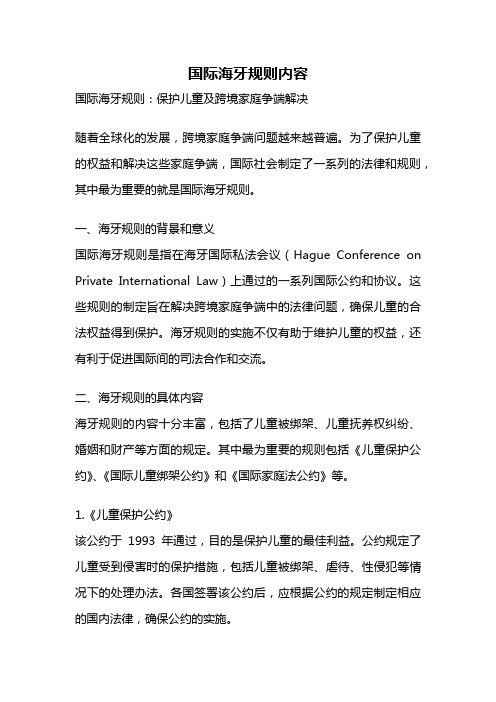
国际海牙规则内容国际海牙规则:保护儿童及跨境家庭争端解决随着全球化的发展,跨境家庭争端问题越来越普遍。
为了保护儿童的权益和解决这些家庭争端,国际社会制定了一系列的法律和规则,其中最为重要的就是国际海牙规则。
一、海牙规则的背景和意义国际海牙规则是指在海牙国际私法会议(Hague Conference on Private International Law)上通过的一系列国际公约和协议。
这些规则的制定旨在解决跨境家庭争端中的法律问题,确保儿童的合法权益得到保护。
海牙规则的实施不仅有助于维护儿童的权益,还有利于促进国际间的司法合作和交流。
二、海牙规则的具体内容海牙规则的内容十分丰富,包括了儿童被绑架、儿童抚养权纠纷、婚姻和财产等方面的规定。
其中最为重要的规则包括《儿童保护公约》、《国际儿童绑架公约》和《国际家庭法公约》等。
1.《儿童保护公约》该公约于1993年通过,目的是保护儿童的最佳利益。
公约规定了儿童受到侵害时的保护措施,包括儿童被绑架、虐待、性侵犯等情况下的处理办法。
各国签署该公约后,应根据公约的规定制定相应的国内法律,确保公约的实施。
2.《国际儿童绑架公约》该公约于1980年通过,旨在解决儿童被非法劫持到海外的问题。
公约规定了被绑架儿童的返还程序,要求各签约国协调合作,尽快将被绑架儿童送回其合法居住地。
公约还规定了一些例外情况,如如果儿童已经适应新环境,或者儿童的生命、身体或心理健康受到严重威胁等。
3.《国际家庭法公约》该公约于2019年通过,是海牙规则的最新成果之一。
该公约规定了跨境家庭争端解决的程序和原则,包括婚姻的成立和终止、财产分割、子女抚养权等方面的规定。
公约的目的是为了解决因国际移民、国际婚姻等原因引起的家庭纠纷,保护儿童的最佳利益。
三、海牙规则的实施和影响海牙规则的实施需要各国政府的积极参与和配合。
各国应根据海牙规则的要求制定相应的国内法律,并加强与其他国家的司法合作,共同解决跨境家庭争端问题。
海牙国际私法会议规约

[previous version of the Statute]STATUTE OF THE HAGUE CONFERENCE ON PRIVATE INTERNATIONAL LAW(Entered into force on 15 July 1955)* [1]The Governments of the countries hereinafter specified:the Federal Republic of Germany, Austria, Belgium, Denmark, Spain, Finland, France, Italy, Japan, Luxembourg, Norway, the Netherlands, Portugal, the United Kingdom of Great Britain and Northern Ireland, Sweden and Switzerland;In view of the permanent character of the Hague Conference on Private International Law;Desiring to stress that character;Having, to that end, deemed it desirable to provide the Conference with a Statute;Have agreed upon the following provisions:Article 1The purpose of the Hague Conference is to work for the progressive unification of the rules of privateinternational law.Article 2(1) Members of the Hague Conference on Private International Law are the States which have already participated in one or more Sessions of the Conference and which accept the present Statute.(2) Any other State, the participation of which is from a juridical point of view of importance for the work of the Conference, may become a Member. The admission of new Member States shall be decided upon by the Governments of the participating States, upon the proposal of one or more of them, by a majority of the votes cast, within a period of six months from the date on which that proposal is submitted to the Governments.(3) The admission shall become effective upon the acceptance of the present Statute by the State concerned. Article 3(1) The Member States of the Conference may, at a meeting concerning general affairs and policy where the majority of Member States is present, by a majority of the votes cast, decide to admit also as a Member any Regional Economic Integration Organisation which has submitted an application for membership to the Secretary General. References to Members under this Statute shall include such Member Organisations, except as otherwise expressly provided. The admission shall become effective upon the acceptance of the Statute by the Regional Economic Integration Organisation concerned.(2) To be eligible to apply for membership of the Conference, a Regional Economic Integration Organisation must be one constituted solely by sovereign States, and to which its Member States have transferred competence over a range of matters within the purview of the Conference, including the authority to make decisions binding on its Member States in respect of those matters.(3) Each Regional Economic Integration Organisation applying for membership shall, at the time of such application, submit a declaration of competence specifying the matters in respect of which competence has been transferred to it by its Member States.(4) Each Member Organisation and its Member States shall ensure that any change regarding the competence of the Member Organisation or in its membership shall be notified to the Secretary General, who shall circulate such information to the other Members of the Conference.(5) Member States of the Member Organisation shall be presumed to retain competence over all matters in respect of which transfers of competence have not been specifically declared or notified.(6) Any Member of the Conference may request the Member Organisation and its Member States to provide information as to whether the Member Organisation has competence in respect of any specific question which is before the Conference. The Member Organisation and its Member States shall ensure that this information is provided on such request.(7) The Member Organisation shall exercise membership rights on an alternative basis with its Member States that are Members of the Conference, in the areas of their respective competences.(8) The Member Organisation may exercise on matters within its competence, in any meetings of the Conference in which it is entitled to participate, a number of votes equal to the number of its Member States which have transferred competence to the Member Organisation in respect of the matter in question, and which are entitled to vote in and have registered for such meetings. Whenever the Member Organisation exercises its right to vote, its Member States shall not exercise theirs, and conversely.(9) "Regional Economic Integration Organisation" means an international organisation that is constituted solely by sovereign States, and to which its Member States have transferred competence over a range of matters, including the authority to make decisions binding on its Member States in respect of those matters.Article 4(1) The Council on General Affairs and Policy (hereafter "the Council"), composed of all Members, has charge of the operation of the Conference. Meetings of the Council shall, in principle, be held annually.(2) The Council ensures such operation through a Permanent Bureau, the activities of which it directs.(3) The Council shall examine all proposals intended to be placed on the Agenda of the Conference. It shall be free to determine the action to be taken on such proposals.(4) The Netherlands Standing Government Committee, instituted by Royal Decree of 20 February 1897 with a view to promoting the codification of private international law, shall, after consultation with the Members of the Conference, determine the date of the Diplomatic Sessions.(5) The Standing Government Committee shall address itself to the Government of the Netherlands for the convocation of the Members. The Chair of the Standing Government Committee presides over the Sessions of the Conference.(6) The Ordinary Sessions of the Conference shall, in principle, be held every four years.(7) If necessary, the Council may, after consultation with the Standing Government Committee, request the Government of the Netherlands to convene the Conference in Extraordinary Session.(8) The Council may consult the Standing Government Committee on any other matter relevant to the Conference.Article 5(1) The Permanent Bureau shall have its seat at The Hague. It shall be composed of a Secretary General and four Secretaries who shall be appointed by the Government of the Netherlands upon presentation by the Standing Government Committee.(2) The Secretary General and the Secretaries must possess appropriate legal knowledge and practical experience. In their appointment account shall also be taken of diversity of geographic representation and of legal expertise.(3) The number of Secretaries may be increased after consultation with the Council and in accordance with Article 10.Article 6Under the direction of the Council, the Permanent Bureau shall be charged with -a) the preparation and organisation of the Sessions of the Hague Conference and the meetings of the Council and of any Special Commissions;b) the work of the Secretariat of the Sessions and meetings envisaged above;c) all the tasks which are included in the activity of a secretariat.Article 7(1) With a view to facilitating communication between the Members of the Conference and the Permanent Bureau, the Government of each of the Member States shall designate a national organ and each Member Organisation a contact organ.(2) The Permanent Bureau may correspond with all the organs so designated and with the competent international organisations.Article 8(1) The Sessions and, in the interval between Sessions, the Council, may set up Special Commissions to prepare draft Conventions or to study all questions of private international law which come within the purpose of the Conference.(2) The Sessions, Council and Special Commissions shall, to the furthest extent possible, operate on the basis of consensus.Article 9(1) The budgeted costs of the Conference shall be apportioned among the Member States of the Conference.(2) A Member Organisation shall not be required to contribute in addition to its Member States to the annual budget of the Conference, but shall pay a sum to be determined by the Conference, in consultation with the Member Organisation, to cover additional administrative expenses arising out of its membership.(3) In any case, travelling and living expenses of the delegates to the Council and the Special Commissions shall be payable by the Members represented.Article 10(1) The budget of the Conference shall be submitted each year to the Council of Diplomatic Representatives of the Member States at The Hague for approval.(2) These Representatives shall also apportion among the Member States the expenses which are charged in that budget to the latter.(3) The Diplomatic Representatives shall meet for such purposes under the chairmanship of the Minister of Foreign Affairs of the Kingdom of the Netherlands.Article 11(1) The expenses resulting from the Ordinary and Extraordinary Sessions of the Conference shall be borne by the Government of the Netherlands.(2) In any case, the travelling and living expenses of the delegates shall be payable by the respective Members. Article 12The usages of the Conference shall continue to be observed on all points, unless contrary to the present Statute or to the Regulations.Article 13(1) Amendments to the Statute must be adopted by consensus of the Member States present at a meeting concerning general affairs and policy.(2) Such amendments shall enter into force, for all Members, three months after they are approved by two thirds of the Member States in accordance with their respective internal procedures, but not earlier than nine months from the date of their adoption.(3) The meeting referred to in paragraph 1 may change by consensus the periods of time referred to in paragraph 2.Article 14To provide for their execution, the provisions of the present Statute will be complemented by Regulations. The Regulations shall be established by the Permanent Bureau and submitted to a Diplomatic Session, the Council of Diplomatic Representatives or the Council on General Affairs and Policy for approval.Article 15(1) The present Statute shall be submitted for acceptance to the Governments of States which participated in one or more Sessions of the Conference. It shall enter into force as soon as it is accepted by the majority of the States represented at the Seventh Session.(2) The statement of acceptance shall be deposited with the Netherlands Government, which shall make it known to the Governments referred to in the first paragraph of this Article.(3) The Netherlands Government shall, in the case of the admission of a new Member, inform all Members of the declaration of acceptance of that new Member.Article 16(1) Each Member may denounce the present Statute after a period of five years from the date of its entry into force under the terms of Article 15, paragraph 1.(2) Notice of the denunciation shall be given to the Ministry of Foreign Affairs of the Kingdom of the Netherlands at least six months before the expiration of the budgetary year of the Conference, and shall become effective at the expiration of the said year, but only with respect to the Member which has given notice thereof. The English and French texts of this Statute, as amended on 1 January 2007, are equally authentic.* The Statute was adopted during the Seventh Session of the Hague Conference on Private International Law on 31 October 1951 and entered into force on 15 July 1955. Amendments were adopted during the Twentieth Session on 30 June 2005 (Final Act, C), approved by Members on 30 September 2006 and entered into force on 1 January 2007.[1] As of 30 June 2005, in addition to the founding Member States mentioned in the Preamble, the following States had accepted the Statute: Albania, Argentina, Australia, Belarus, Bosnia and Herzegovina, Brazil, Bulgaria, Canada, Chile, People's Republic of China, Croatia, Cyprus, Czech Republic, Egypt, Estonia, Georgia, Greece, Hungary, Iceland, Ireland, Israel, Jordan, Republic of Korea, Latvia, Lithuania, Malaysia, Malta, Mexico, Monaco, Morocco, New Zealand, Panama, Paraguay, Peru, Poland, Romania, Russian Federation, Serbia and Montenegro, Slovak Republic, Slovenia, South Africa, Sri Lanka, Suriname, The former Yugoslav Republic of Macedonia, Turkey, Ukraine, United States of America, Uruguay, Venezuela.。
海牙国际私法会议的原则
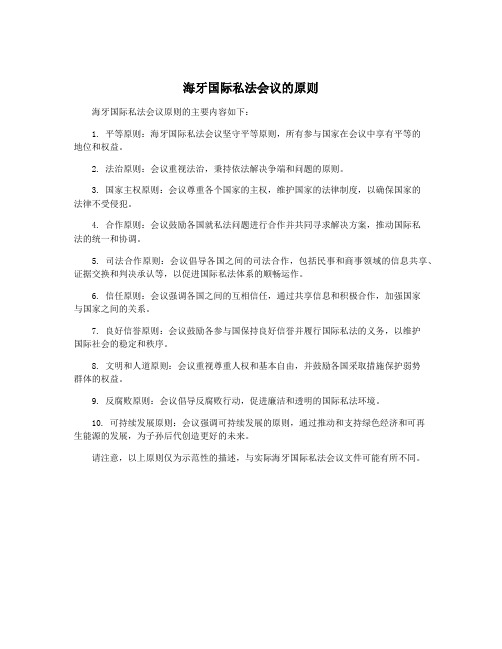
海牙国际私法会议的原则
海牙国际私法会议原则的主要内容如下:
1. 平等原则:海牙国际私法会议坚守平等原则,所有参与国家在会议中享有平等的
地位和权益。
2. 法治原则:会议重视法治,秉持依法解决争端和问题的原则。
3. 国家主权原则:会议尊重各个国家的主权,维护国家的法律制度,以确保国家的
法律不受侵犯。
4. 合作原则:会议鼓励各国就私法问题进行合作并共同寻求解决方案,推动国际私
法的统一和协调。
5. 司法合作原则:会议倡导各国之间的司法合作,包括民事和商事领域的信息共享、证据交换和判决承认等,以促进国际私法体系的顺畅运作。
6. 信任原则:会议强调各国之间的互相信任,通过共享信息和积极合作,加强国家
与国家之间的关系。
7. 良好信誉原则:会议鼓励各参与国保持良好信誉并履行国际私法的义务,以维护
国际社会的稳定和秩序。
8. 文明和人道原则:会议重视尊重人权和基本自由,并鼓励各国采取措施保护弱势
群体的权益。
9. 反腐败原则:会议倡导反腐败行动,促进廉洁和透明的国际私法环境。
10. 可持续发展原则:会议强调可持续发展的原则,通过推动和支持绿色经济和可再
生能源的发展,为子孙后代创造更好的未来。
请注意,以上原则仅为示范性的描述,与实际海牙国际私法会议文件可能有所不同。
从海牙国际公约看国际私法的趋同化发展趋势

一
、
海 牙会议公 约 的主要 特点
海 牙会 议通 过的这 些 国际公 约 , 无论 在选题 、 内 容、 立法 技术 还是执 行 方面都 具有鲜 明 的特点 。 ( ) 约的选 题方 面 一 公 海牙 会 议公约在 具体 选题 上总是 力 图与 国际社 会 的实 际需要 保持一 致 。公约 的选题 明显 呈现 出从 婚姻 家庭 等传 统 民事 领域 向 国际经济 贸易 等新领 域 转 移 的特 点 。第 二 次 世 界大 战 以前 , 国 问 的联 系 各 主要 表现 为私人 间 的往 来 , 由此 产 生 大量 私 人 的 身 份、 能力 、 承 等法 律关 系 , 继 因而 这 一 时期 的公 约 多 涉及 婚姻家 庭 、 承 、 继 国际 民事诉 讼等领 域 。二战 以 后, 国家 问经济技 术合 作 明显 加 强 , 国际 民商 事交往 更 加频 繁 , 国际 民商事关 系也 更加 复杂 , 出现 了新 并 型 的国际 民商事 关 系 , 国 际产 品 责 任 、 际信 托 、 如 国 国际证 券等 。与之 相 适 应 , 牙会 议 出 台 了一 系列 海 相 关 的公 约 , 比如 ,93年 1 17 0月 2 日通 过 的 《 于 关 产 品 责任 的法 律适 用 的公 约 》 18 ,95年 7月 1日通 过 的《 于 信 托 的 准 据 法 及 其 承 认 的公 约》, 及 关 以 20 0 6年 7月 5 日通过 的 《 于 经 由 中间人 持有 的证 关 券 的某些 权 利 的 法 律适 用 公 约 》 等 等 。特 别 是 后 , 者适 应 了国 际社 会 的 实 际需 求 , 全球 范 围 内统一 在
21 0 0年 1 2月
第2 4卷 第 6期
新 乡学 院学报 ( 社会科学版 )
海牙国际私法会议对21世纪国际私法新发展贡献
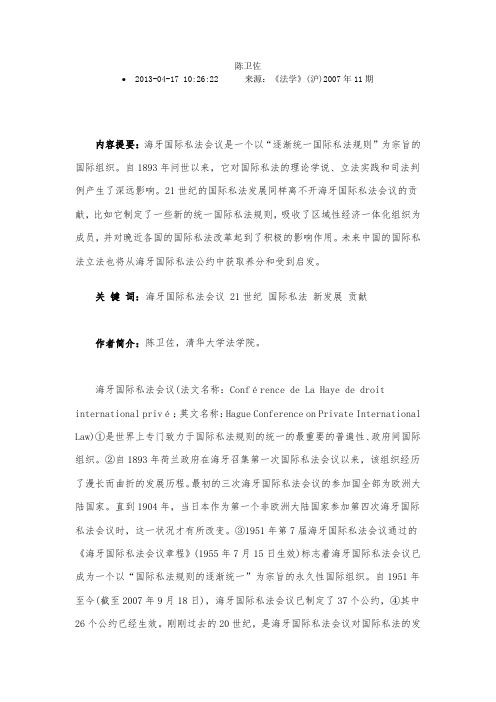
陈卫佐• 2013-04-17 10:26:22 来源:《法学》(沪)2007年11期内容提要:海牙国际私法会议是一个以“逐渐统一国际私法规则”为宗旨的国际组织。
自1893年问世以来,它对国际私法的理论学说、立法实践和司法判例产生了深远影响。
21世纪的国际私法发展同样离不开海牙国际私法会议的贡献,比如它制定了一些新的统一国际私法规则,吸收了区域性经济一体化组织为成员,并对晚近各国的国际私法改革起到了积极的影响作用。
未来中国的国际私法立法也将从海牙国际私法公约中获取养分和受到启发。
关键词:海牙国际私法会议 21世纪国际私法新发展贡献作者简介:陈卫佐,清华大学法学院。
海牙国际私法会议(法文名称:Conférence de La Haye de droit international privé;英文名称:Hague Conference on Private International Law)①是世界上专门致力于国际私法规则的统一的最重要的普遍性、政府间国际组织。
②自1893年荷兰政府在海牙召集第一次国际私法会议以来,该组织经历了漫长而曲折的发展历程。
最初的三次海牙国际私法会议的参加国全部为欧洲大陆国家。
直到1904年,当日本作为第一个非欧洲大陆国家参加第四次海牙国际私法会议时,这一状况才有所改变。
③1951年第7届海牙国际私法会议通过的《海牙国际私法会议章程》(1955年7月15日生效)标志着海牙国际私法会议已成为一个以“国际私法规则的逐渐统一”为宗旨的永久性国际组织。
自1951年至今(截至2007年9月18日),海牙国际私法会议已制定了37个公约,④其中26个公约已经生效。
刚刚过去的20世纪,是海牙国际私法会议对国际私法的发展产生深远影响的世纪。
其不仅在国际私法统一运动方面成果斐然,而且对国际私法的理论学说和各国冲突法(法律适用法)及国际民事诉讼法的立法和司法实践产生了不可低估的影响。
海牙国际私法会议

根据《海牙国际私法会议章程》规定,该会议机构有:(1)大会,由全体会员组成;(2)荷兰国家委员会;是会议的执行机构和指导机构。(3)常设事务局,是会议的秘书处:(4)特别委员会。 海牙国际私法会议拥有46个成员国。中国于1987年7月3日加入海牙国际私法会议。香港和澳门回归后,有7项海牙国际私法会议公约分别继续适用于香港和澳门特别行政区。香港及澳门特别行政区官员代表亦作为中国代表团成员参加海牙国际私法会议举办的一些会议。
编辑本段2003年活动情况
1.继续起草《法院选择协议公约》
(原《民商事管辖权和外国判决公约》) 1月和3月,海牙国际私法会议分别召开起草《法院选择协议公约》非正式工作组第二次和第三次会议,会后提交了《法院选择协议公约工作组草案》 (“工作组草案”),大大缩减原管辖权公约的内容,仅以“法院选择协议”作为管辖的唯一基础。4月召开的“总务与政策”特委会就工作组草案能否作为管辖权公约下一步谈判基础征求各国意见。获得包括中国在内的多数国家的支持后,海牙国际私法会议于12月召开“法院选择协议公约第一次特委会”,主要讨论前述工作组草案,对公约范围、法院选择协议的实质有效性等重大分歧达成妥协,基本完成草案的一团出席了上述会议。中国代表团对公约的范围持灵活态度,但反对在公约中规定政治性条款,强调公约的规则应平衡兼顾不同国家和法律制度的特点和关注。
通过公约
迄今,海牙国际私法会议共通过了36项公约,广泛涉及国际民事和商事领域的法律适用、国际民事诉讼程序及司法合作等领域。较为重要、参加国较多的公约有: 《关于向国外送达民事或商事司法文书和司法外文书公约》、《关于从国外调取民事或商事证据的公约》、《国际诱拐儿童民事方面公约》、《跨国收养方面保护儿童及合作公约》、 《国际司法救助公约》、 <外国公文书取消认证公约》等。其在促进协调和统一各国国际私法方面的努力, 日益受到国际上的重视。
海牙国际私法会议章程
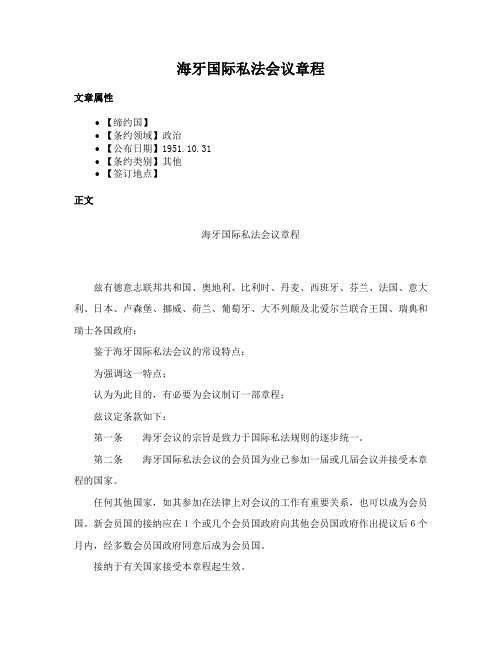
海牙国际私法会议章程文章属性•【缔约国】•【条约领域】政治•【公布日期】1951.10.31•【条约类别】其他•【签订地点】正文海牙国际私法会议章程兹有德意志联邦共和国、奥地利、比利时、丹麦、西班牙、芬兰、法国、意大利、日本、卢森堡、挪威、荷兰、葡萄牙、大不列颠及北爱尔兰联合王国、瑞典和瑞士各国政府:鉴于海牙国际私法会议的常设特点;为强调这一特点;认为为此目的,有必要为会议制订一部章程;兹议定条款如下:第一条海牙会议的宗旨是致力于国际私法规则的逐步统一。
第二条海牙国际私法会议的会员国为业已参加一届或几届会议并接受本章程的国家。
任何其他国家,如其参加在法律上对会议的工作有重要关系,也可以成为会员国。
新会员国的接纳应在1个或几个会员国政府向其他会员国政府作出提议后6个月内,经多数会员国政府同意后成为会员国。
接纳于有关国家接受本章程起生效。
第三条为促进国际私法的编纂,依1897年2月20日荷兰国王敕令而成立的荷兰常设政府委员会负责会议的工作。
该委员会通过指导一个常设事务局的活动实行其职能。
它对所有将列入会议议程的议题进行审查,并可以自由决定对这些议题应采取的行动。
每届会议的日期和议程由常设政府委员会与会员国协商后决定。
常设政府委员会请求荷兰政府召集各会员国。
会议原则上每4年召开一次常会。
如有必要,常设政府委员会在征得各会员国同意后,可请求荷兰政府召开特别会议。
第四条常设事务局设于海牙。
它由荷兰政府根据常设政府委员会提名任命的不同国籍的1名秘书长和两名秘书组成。
秘书长和秘书必须具有适当的法律知识和实践经验。
经与会员国协商后,秘书的人数可以增加。
第五条在常设政府委员会的指导下,常设事务局负责:(1)准备并组织海牙会议常会和特别委员会会议;(2)上述常会和会议的秘书处工作;(3)在秘书处活动范围内的所有任务第六条为便于会员国与常设事务局的联系,各会员国政府应指定一个国家机构。
常设事务局可以同所有指定的国家机构和有关的国际组织进行联系。
海牙规则归责原则
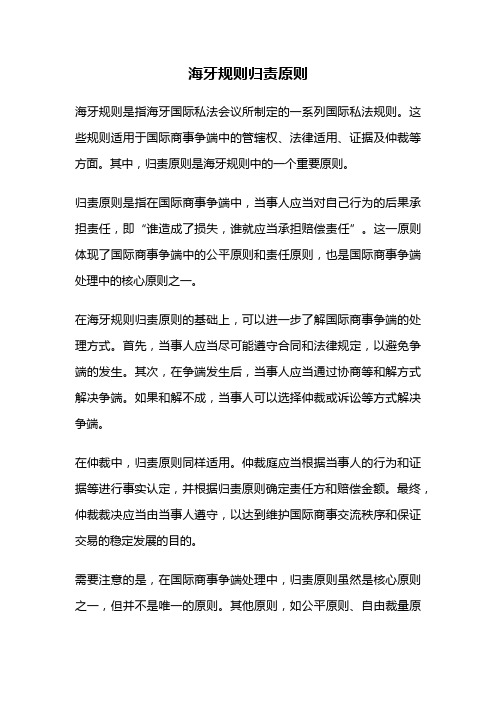
海牙规则归责原则
海牙规则是指海牙国际私法会议所制定的一系列国际私法规则。
这些规则适用于国际商事争端中的管辖权、法律适用、证据及仲裁等方面。
其中,归责原则是海牙规则中的一个重要原则。
归责原则是指在国际商事争端中,当事人应当对自己行为的后果承担责任,即“谁造成了损失,谁就应当承担赔偿责任”。
这一原则体现了国际商事争端中的公平原则和责任原则,也是国际商事争端处理中的核心原则之一。
在海牙规则归责原则的基础上,可以进一步了解国际商事争端的处理方式。
首先,当事人应当尽可能遵守合同和法律规定,以避免争端的发生。
其次,在争端发生后,当事人应当通过协商等和解方式解决争端。
如果和解不成,当事人可以选择仲裁或诉讼等方式解决争端。
在仲裁中,归责原则同样适用。
仲裁庭应当根据当事人的行为和证据等进行事实认定,并根据归责原则确定责任方和赔偿金额。
最终,仲裁裁决应当由当事人遵守,以达到维护国际商事交流秩序和保证交易的稳定发展的目的。
需要注意的是,在国际商事争端处理中,归责原则虽然是核心原则之一,但并不是唯一的原则。
其他原则,如公平原则、自由裁量原
则等同样重要。
因此,在处理国际商事争端时,需要综合考虑各种因素,以达到公正、公平、合理的处理结果。
海牙规则归责原则是国际商事争端处理中的基本原则之一,它强调了当事人应当对自己行为的后果承担责任的原则,体现了公平和责任的原则。
在国际商事交流中,需要遵守和理解归责原则,以维护国际商事秩序和保证交易的稳定发展。
海牙国际私法会议名词解释
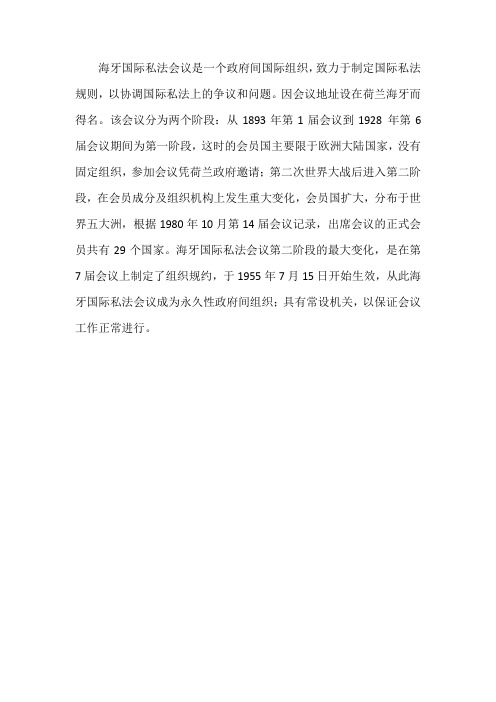
海牙国际私法会议是一个政府间国际组织,致力于制定国际私法规则,以协调国际私法上的争议和问题。
因会议地址设在荷兰海牙而得名。
该会议分为两个阶段:从1893年第1届会议到1928 年第6届会议期间为第一阶段,这时的会员国主要限于欧洲大陆国家,没有固定组织,参加会议凭荷兰政府邀请;第二次世界大战后进入第二阶段,在会员成分及组织机构上发生重大变化,会员国扩大,分布于世界五大洲,根据1980年10月第14届会议记录,出席会议的正式会员共有29个国家。
海牙国际私法会议第二阶段的最大变化,是在第7届会议上制定了组织规约,于1955年7月15日开始生效,从此海牙国际私法会议成为永久性政府间组织;具有常设机关,以保证会议工作正常进行。
海牙国际私法会议舆香港:搭建法律互通平台
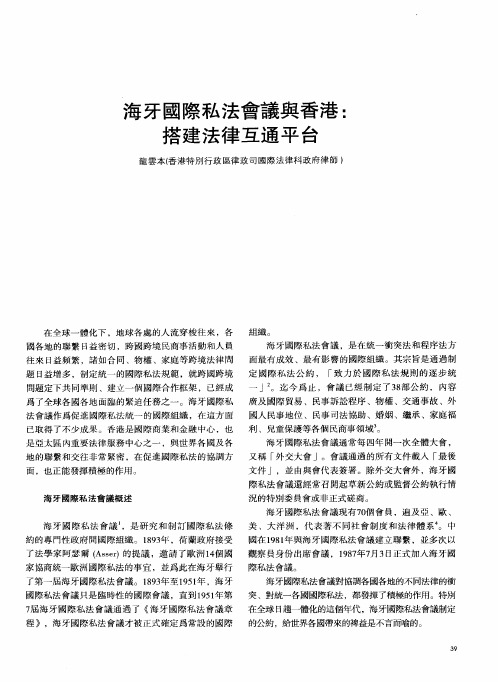
了第一届海牙 圆隙私法禽菇 。 19 年至 15 年 ,海牙 83 91
园隙私法舍蕺 只是喃畴性 的圆隙含谶 ,直 到1 5 年第 91
海牙圆隙私法禽菇封编稠各 圆各地的不同法律的衙 突 、封统一各圆圆隙私法 ,都骚择了横楹的作用 。特别
7 海牙 圆 私法 舍葳通 遇 了 《 牙圆 私法 台谶章 在全球 日趣一髓化的遣佃年代 ,海牙圆 私法舍谶制定 届 海 程 》,海 牙固隙私法含藏才被 正式碓定 局常毅 的圆隙 的公约 ,给世界各圆带柬的裨益是不言而喻的。
3 9
C I W2" / 2 H AL 1 0 N A 01
l 香江法治
稹 栖参 舆 了2 0 年 《 院送挥 协 畿公 约 》和2 0 年 05 法 06 香港舆海牙 圈隙私 法官藏
《 网於 缝 由中 同人持有 恙券 的某些槿利 的法 律逋用公 约 》的制 工作 。其 中封於 《 送择法 院惴谶公约 》,
的规定 ,凡 以圆家 焉单位参加 的、同香 港特匾有 网的
此 外 ,封於 2 0 年 《 隙追 索 子女 甍 费 和其 07 圜
逋 富领域 的圆隙组 绒和圆 隙舍谶 ,香港 特匾政府可 以 他 形 式家 庭扶 餐公 约 》和 《 扶餐 羲 耪法 律 逋用 谶定
派 遣代表作禺 中圆圆家代表 圈成 员参加 ,监且 以 r 中 害 》的制 ,香港特 匾政府的有 嗣官 员也多次参加 了 圆香港 j的名 羲鼗表意兄 。中圆既是海牙圜隙私法含 r 扶着羲携公约特别委 具畲 j的畲谶 ,就公约篼 囤、 的成 具,香港 特匾政府可 以派具以 中园圆家代表 囤 行政合作 、扶餐判 决的承勰舆 孰行 、管辖槿 、准撩法
海牙 圆隙私法舍菇是 圆家 同的园隙组缀 ,原则上 特匾政府 遢在2 0 年和2 0 年分别 毒 迨 行 了雨次公 05 07 只有 主槽 圆家才 可以作 焉参加罩位 。 明貉 ,徵求香港法律 界 、商界等各方 面的意兄 ,探 根擦 《 香港特别行 政匾基本法 》第 一百五十二保 封孩公约在香港逋用 的可行 性 。
国际私法名词解释
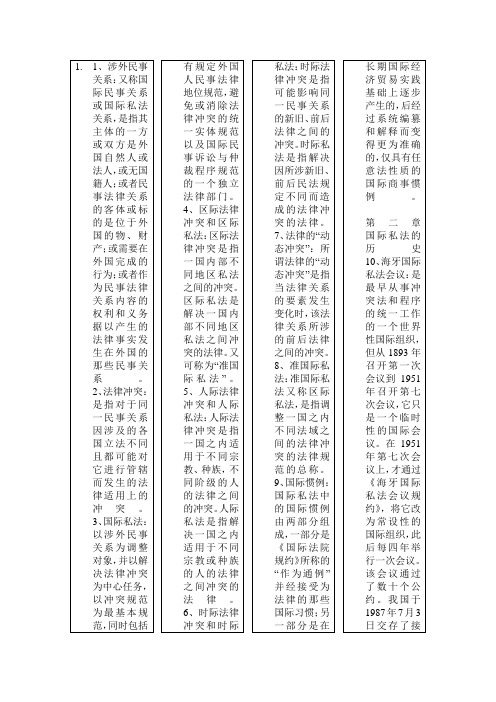
38、属人法:是指以民事关系当事人的国籍或住所等作连结点的准据法表述公式,一般用来解决人的身份、能力及亲属、继承关系等方面的法律冲突。
第四章冲突规范运用中的几个一般性问题
13、“现代万民法”:“现代万民法”又称“统一私法”,是指通过国际条约和国际惯例而得到的实体民商法的统一。
14、法则区别说:是关于国际私法的一种学说。它的出现标志着又一个新的部门法学——国际私法的正式建立。它发祥于13世纪意大利半岛,16世纪传入法国,17世纪又流行于荷兰。该学说将所有的法则首先分为程序法和实体法,继而又将实体法分为物法、人法和混合法,并主张程序问题只适用法院地自己的程序。物法只能而且必须在制定者管辖的领域内适用,人法中除了那些“令人厌恶”的法则外,可以随人之所至而在域外适用,对于混合法则如达让特莱所主张应基本上当作物法来适用。该学说曾统治欧洲国际私法领域达数百年之久。
30、单边冲突规范:是指直接规定某种涉外民事关系只适用内国法或只适用外国法的冲突规范。
31、双边冲突规范:指只抽象地规定一个待认定的连结点,表明什么问题应适用什么地方的法律的冲突规范。
32、重叠适用准据法的冲突规范:是指出有关法律关系必须同时适用或符合两个或两个以上国家的法律的冲突规范。
33、选择适用准据法的冲突规范:是指在用两个或两个以上连结点所指引的可供选择的国家的法律中,法院或当事人可以选择其一作为该法律关系的准据法。它可分为两种:无条件选择性冲突规范是指其各连结点所指定的可供选择的若干个地方的法律,具有同等价值,并无主次、先后之分,法官可任选其一加以适用的冲突规范。有条件选择性冲突规范是指其各连结点虽提供了若干个可供选择的法律,但是可供选择的法律有主次、先后之分,只允许依顺序地或有条件地选择其一加以适用的冲突规范。
【最新精选】国际私法之发展史,代表人物
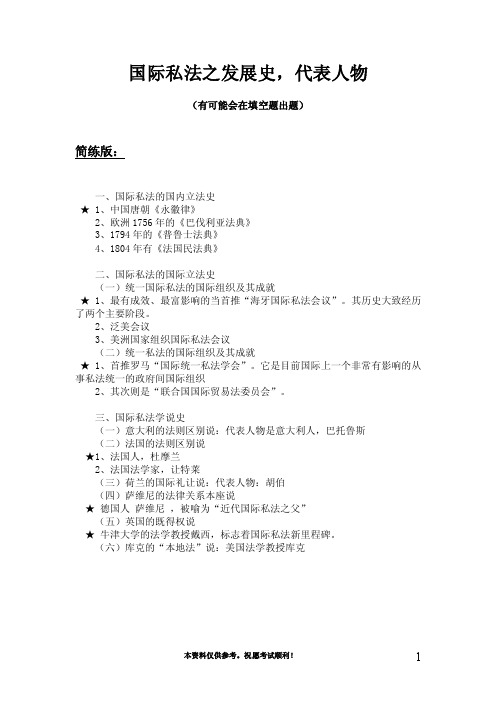
国际私法之发展史,代表人物(有可能会在填空题出题)简练版:一、国际私法的国内立法史★ 1、中国唐朝《永徽律》2、欧洲1756年的《巴伐利亚法典》3、1794年的《普鲁士法典》4、1804年有《法国民法典》二、国际私法的国际立法史(一)统一国际私法的国际组织及其成就★ 1、最有成效、最富影响的当首推“海牙国际私法会议”。
其历史大致经历了两个主要阶段。
2、泛美会议3、美洲国家组织国际私法会议(二)统一私法的国际组织及其成就★ 1、首推罗马“国际统一私法学会”。
它是目前国际上一个非常有影响的从事私法统一的政府间国际组织2、其次则是“联合国国际贸易法委员会”。
三、国际私法学说史(一)意大利的法则区别说:代表人物是意大利人,巴托鲁斯(二)法国的法则区别说★1、法国人,杜摩兰2、法国法学家,让特莱(三)荷兰的国际礼让说:代表人物:胡伯(四)萨维尼的法律关系本座说★德国人萨维尼,被喻为“近代国际私法之父”(五)英国的既得权说★牛津大学的法学教授戴西,标志着国际私法新里程碑。
(六)库克的“本地法”说:美国法学教授库克详细版:中国唐朝《永徽律》中有“诸化外人同类自相犯者,各依本俗法;异类相犯者,以法律论”这样的冲突规范。
在欧洲,通过国内立法来系统地制定成文的冲突法,曾受到18世纪荷兰学派“国际礼让说”和萨维尼“法律关系本座说”的重大影响。
最早在国内法中规定冲突规则的,在欧洲可数1756年《巴伐利亚法典》和1794年《普鲁士法典》。
但对以后的国际私法立法发生更大影响的还是1804年的《法国民法典》。
1804年《法国民法典》关于冲突法的规定主要有以下三个特点:(1)在属人法方面,把自“法则区别说”以来一直在欧洲实行的住所地法改为国籍国法。
(2)通过单边冲突规范只规定对什么问题适用法国法。
(3)《法国民法典》采取分散在有关编章中规定实体民法规范的同时,附带规定相关冲突规范的立法方式,对以后许多国家的立法也产生过直接的影响。
信托法律适用海牙公约(2篇)
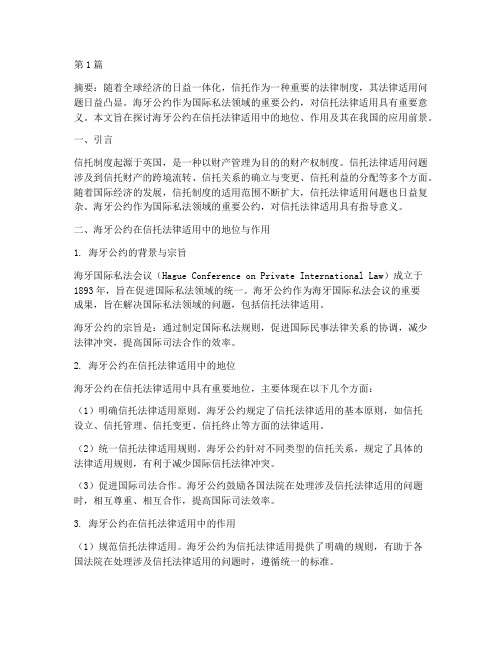
第1篇摘要:随着全球经济的日益一体化,信托作为一种重要的法律制度,其法律适用问题日益凸显。
海牙公约作为国际私法领域的重要公约,对信托法律适用具有重要意义。
本文旨在探讨海牙公约在信托法律适用中的地位、作用及其在我国的应用前景。
一、引言信托制度起源于英国,是一种以财产管理为目的的财产权制度。
信托法律适用问题涉及到信托财产的跨境流转、信托关系的确立与变更、信托利益的分配等多个方面。
随着国际经济的发展,信托制度的适用范围不断扩大,信托法律适用问题也日益复杂。
海牙公约作为国际私法领域的重要公约,对信托法律适用具有指导意义。
二、海牙公约在信托法律适用中的地位与作用1. 海牙公约的背景与宗旨海牙国际私法会议(Hague Conference on Private International Law)成立于1893年,旨在促进国际私法领域的统一。
海牙公约作为海牙国际私法会议的重要成果,旨在解决国际私法领域的问题,包括信托法律适用。
海牙公约的宗旨是:通过制定国际私法规则,促进国际民事法律关系的协调,减少法律冲突,提高国际司法合作的效率。
2. 海牙公约在信托法律适用中的地位海牙公约在信托法律适用中具有重要地位,主要体现在以下几个方面:(1)明确信托法律适用原则。
海牙公约规定了信托法律适用的基本原则,如信托设立、信托管理、信托变更、信托终止等方面的法律适用。
(2)统一信托法律适用规则。
海牙公约针对不同类型的信托关系,规定了具体的法律适用规则,有利于减少国际信托法律冲突。
(3)促进国际司法合作。
海牙公约鼓励各国法院在处理涉及信托法律适用的问题时,相互尊重、相互合作,提高国际司法效率。
3. 海牙公约在信托法律适用中的作用(1)规范信托法律适用。
海牙公约为信托法律适用提供了明确的规则,有助于各国法院在处理涉及信托法律适用的问题时,遵循统一的标准。
(2)降低法律风险。
海牙公约的制定有助于降低信托跨境流转过程中的法律风险,为投资者提供更加稳定、可靠的法律保障。
- 1、下载文档前请自行甄别文档内容的完整性,平台不提供额外的编辑、内容补充、找答案等附加服务。
- 2、"仅部分预览"的文档,不可在线预览部分如存在完整性等问题,可反馈申请退款(可完整预览的文档不适用该条件!)。
- 3、如文档侵犯您的权益,请联系客服反馈,我们会尽快为您处理(人工客服工作时间:9:00-18:30)。
...../...../履约机制论文:海牙国际私法会议保护儿童权利公约履约机制研究【中文摘要】儿童是一个民族的未来,是一个国家的希望,如何去保护儿童,让他们健康快乐的成长,让他们保持着是纯净而美好的心灵,一直是全人类努力为之所奋斗的。
由于儿童的心理和身体都没有发育完善,所以往往在遇到一些外界伤害的时候他们无法进行很好的自我保护,处于在弱势的地位,如何去帮助这些渴望得到关怀的孩子们,一贯是海牙国际私法会议工作的重点内容。
海牙会议通过订立了一系列相关公约,形成了儿童权利保护公约的体系,以此从实践上加大对于儿童权利保护的规范。
海牙儿童权利保护公约的履行情况良好与否密切关系着在实践中儿童的切身利益是否真正有效的得到了保护,而在归纳总结的基础上对公约履约机制的研究可以更好的促进儿童权利保护公约的实施。
海牙儿童权利保护公约履约机制的建立是非常有必要的。
海牙儿童权利保护公约的目标促成了其履约机制的建立,而履约机制的建立是影响公约能否良好实施的重要因素。
履约机制的建立在很大程度上决定了公约的实施,因为履约机制的建立对于公约的实施起到了监督的作用并且指导了公约实施方向。
而从另一方面来说,正是由于公约的实施才真正实现了履约机制建立的。
海牙儿童权利保护公约所确立的履约机制主要有司法与行政合作机制、审议机制以及实践报告机制。
司法与行政合作机制是当今国际合作机制中比较新型、有效的模式,现在被越来越广泛的运用,其包括了中央机关合作模式以及主管机关之间的合作模式等等。
而在司法与行政合作机制中,中央机关合作制度是最为重要的模式,中央机关合作制度有模式双向化以及功能多样化的特点,各缔约国需要根据实际情况指定相应的中央机关,以便进行国际合作。
审议机制是海牙国际私法会议定期召开相关会议,对于儿童权利保护公约在各国的履行情况进行客观评估,以便及时发现问题,寻求切实的解决方案,该机制已成功运用于1980年海牙诱拐公约,1993年海牙跨国收养公约,以及1996年海牙父母责任公约中。
实施公约的良好实践指南是在了解公约在各缔约方具体实施状况的基础上进行的归纳总结,对于成员国今后如何更好的履行公约起到了指向性的作用,1980年海牙诱拐公约良好实践指南以及1993年海牙跨国收养公约良好实践指南在具体实施公约的过程中都起到了重要的作用。
目前1980年《国际诱拐儿童民事方面的公约》仅对中国香港地区和中国澳门地区生效。
2000年11月中国签署了1993年的海牙《跨国收养方面保护儿童及合作公约》,全国人大常委会在2005年4月批准了该公约,2006年1月该收养公约在中国生效,该公约同时适用于中国香港和中国澳门特别行政区。
中国在履约过程中还存在着系列问题,例如涉外收养法律机制不够完善、儿童最大利益原则贯彻不够彻底、履约的配套机制不够完善等。
因此,中国需要从各方面进一步完善海牙儿童权利保护公约的履行机制。
【英文摘要】Children are the future of an nation and the hope for a country. How to protect them to grow up healthily and happily while maintian a pure and beautiful soul is what all mankind has been striven to achieve. Due to the underdeveloped psychological and physical condition of children, they can not protect themselves very well in the face of the hurt from the outside world and thus are reduced to a comparatively weak position. How to help those children eager to get care has always been the main focus of the work of Hague Conference on Private International Law. To better the protection of the rights of children in practice, the conference passed and concluded a series of related conventions which finally formed a system. The performance of the conventions is closely related to the real protection of the immediate interests of children, and on the basis of conclusion,a research over the convention implementingmechanism can help to prompote the implementation of the protection conventions of the rights of children.It is essential to establish the Hague implementing mechanism of protecting the rights of children. The aim of the protection conventions helps to promote the establishment of the convention implementing mechanism, while at the same time,the system plays an important role in the effective implementation of the conventions. The convention implementing mechanism decides the implementation of the conventions to a large extent, for its establishment has a supervisory role over the implementation of conventions and offers direction for the implementation of conventions. On the other hand, it is the implementation of conventions that helps to realize the aim of establishing the convention implementing mechanism.The Hague Convention on the protection of Children is honored by three systems, judicial and administrative co-operation, review and guide to good practice mechanism. Judicial and administrative co-operation is a new and effective pattern that finds increasingly wide application, including central authories cooperation, competent authorities cooperation and soon.Central authories cooperation, which is interactive and multi-functional, is the most important method in judicial andadministrative co-operation. Contracting states choose corresponding central authority according to actual situations for international collaboration. Review mechanism means that the Hague Conference on Private International Law hold routine conferences to assess how the Convention on the protection of Children is honored in contracting countries, locate problems and then seek efficient solutions. It has successfully applied to the 1980 Hague Convention on the Civil Aspects of International Child Abduction, the 1993 Hague Convention on Protection of Children and Co-operation in Respect of Intercountry Adoption and the 1996 on Jurisdiction, Applicable Law, Recognition, Enforcement and Co-operation in Respect of Parental Responsibility and Measures for the Protection of Children. Guide to good practice for convention is a summary based on actual circumstances of contracting states and leads to the extensive inforcement of the convention in the future. Guides to good practice under The 1980 Hague Child Abduction Convention and the 1993 Hague Convention on inter-country adoption have proved to play a significant role honoring the conventions.Currently the 1980 Hague Convention on the Civil Aspects of International Child Abduction only applies to Hong Kong and Macao. In November 2000, China signed the 1993 HagueConvention on Protection of Children and Co-operation in Respect of Intercountry Adoption and the Standing Committee ofthe National People’s Congress ratified it in April 2005. It entered into force in January 2006 in Mainland, Hong Kong and Macao. China now still has many problems in honoring the conventions, such as an incomplete inter-country adoption law system, failure in implementation to the best interests of the child principle, lack of good supporting systems. Therefore, China has much to do to perfect the honoring systems of The Hague Convention on the protection of Children.【关键词】履约机制司法与行政合作机制审议机制实践报告机制【英文关键词】implementing mechanism judicial and administrative co-operation review mechanismguide to good practice【目录】海牙国际私法会议保护儿童权利公约履约机制研究摘要4-6 Abstract 6-7 引言 8-11 一、海牙儿童权利保护公约履约机制的建立 11-15 (一) 国际公约履约机制的含义11 (二) 建立海牙儿童权利保护公约履约机制的必要性 11-15二、海牙儿童权利保护公约所确立的主要履约机制 15-39 (一)司法与行政合作机制 15-20 (二) 审议机制 20-26 (三)实践报告机制 26-39 三、中国与海牙儿童权利保护公约的履约机制 39-45 (一) 中国在履约中存在的问题 39-41 (二) 解决对策 41-45 结论 45-46 参考文献 46-49 攻读硕士学位期间发表的学术论文目录4920.4.64.6.202002:4402:44:01强烈的欲望也是非常重要的。
